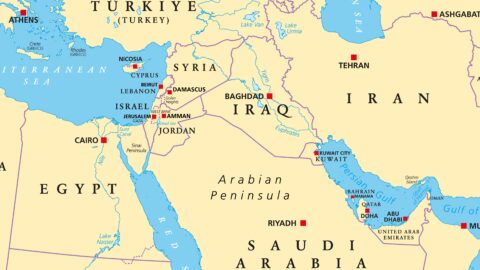The escalation spiral in the Middle East continues. During the night from Saturday to Sunday, US fighter jets and submarines attacked three important nuclear facilities in Iran: Fordow, Natanz and Isfahan. Iran’s response and the development of crude oil prices will be decisive for the impact of this event on the global economy and financial markets.
Threat
Israel and Iran are not natural enemies, as the two countries do not share a border. However, it is Iranian state doctrine to destroy the State of Israel. The International Atomic Energy Agency (IAEA) estimates that Iran already has 400 kilograms of highly enriched uranium with a purity of 60%. It is only a small step from there to the 90% purity required for weapons.
Outbreak of war
Last year, mutual missile strikes between Iran and Israel marked a new level of escalation. However, the exchange of blows was short-lived. The next intensification took place on the night of 12 to 13 June. At that time, Israel began bombing nuclear facilities, missile launch bases and military installations, and killing high-ranking military personnel and scientists. Israel’s stated goal is to eliminate the existential threat posed by Iran. Since then, Israel and Iran have been exchanging rocket fire.
However, Israel’s military capacity is too limited to cause significant damage to Iran’s nuclear facilities and delay the development of nuclear bombs, at least for a considerable period of time. The alternative of regime change through bombing is also not particularly promising. This raises the question of how long the conflict will last and how it might end. Will Iran destroy its missile launch bases before Israel’s missile defence systems can be deployed? If victory for either side is unrealistic, when will negotiations resume?
Operation Midnight Hammer
Last week, indications of US involvement intensified. The US military may have the GBU-57 Massive Ordnance Penetrator (MOP) heavy bomb at its disposal to destroy or at least significantly weaken Iran’s nuclear programme. The US attack on three Iranian nuclear facilities on the night of 22 June was large-scale and targeted. Three nuclear facilities (Fordow, Natanz and Isfahan) were to be destroyed. More than 125 military aircraft were involved, including B-2 bombers, which deployed the bunker-busting GBU-57 MOP bomb. According to the Pentagon, the US is not seeking war, but will respond if US citizens, partners or interests are threatened. Iran has the opportunity to negotiate.
Negotiations
If the US attack was indeed successful, a de-escalation will take place in a positive scenario:
- Israel abandons its goal of regime change through bombing because the nuclear programme has been eliminated or weakened sufficiently.
- The US’s willingness to go to war is being curbed by the isolationist MAGA (Make America Great Again) movement. In addition, the risk of recession would increase in the event of a significant rise in oil prices.
- Continued bombing of Iran with US involvement would probably not bring about regime change, but would severely weaken the country economically. Iran would also face the threat of becoming a failed state (ungovernable).
- The neighbouring Arab states have no interest in this, nor in an attack on oil infrastructure facilities in the region.
Iran could therefore signal its willingness to negotiate and refrain from retaliatory strikes. This scenario would be positive for risky asset classes such as equities and negative for the oil price (which would fall).
Retaliation
However, a military response by Iran to the US attack is considered highly likely. The question is how strong it will be. If it is only minor, a spiral of escalation could be avoided. However, a major attack on a US military base (Iraq, Qatar, Bahrain), on oil infrastructure in neighbouring Arab countries or on the Strait of Hormuz could draw the US into a war with Iran. Although escalation does not seem rational, it is certainly realistic. This means that the risk of a further rise in oil prices has increased. As a general rule, the higher the rise in oil prices, the greater the resulting loss of purchasing power and the higher the risk for economic growth and the stock markets.
Positioning
Our current base scenario is that negotiations will take place, leading to a de-escalation of the conflict. We therefore do not intend to adjust our slightly defensive positioning for the time being. This expectation is also reflected in current market prices. At the start of the trading week, futures contracts on European and US stock markets are only slightly down, meaning that the stock markets are likely to start the week with only slight losses. Yields on credit-secure government bonds are also little changed at the start of trading. Although the price of oil (Brent crude) rose sharply overnight, the market quickly calmed down again.
Legal disclaimer
This document is an advertisement. Unless indicated otherwise, source: Erste Asset Management GmbH. The language of communication of the sales offices is German and the languages of communication of the Management Company also include English.
The prospectus for UCITS funds (including any amendments) is prepared and published in accordance with the provisions of the InvFG 2011 as amended. Information for Investors pursuant to § 21 AIFMG is prepared for the alternative investment funds (AIF) administered by Erste Asset Management GmbH pursuant to the provisions of the AIFMG in conjunction with the InvFG 2011.
The currently valid versions of the prospectus, the Information for Investors pursuant to § 21 AIFMG, and the key information document can be found on the website www.erste-am.com under “Mandatory publications” and can be obtained free of charge by interested investors at the offices of the Management Company and at the offices of the depositary bank. The exact date of the most recent publication of the prospectus, the languages in which the fund prospectus or the Information for Investors pursuant to Art 21 AIFMG and the key information document are available, and any other locations where the documents can be obtained are indicated on the website www.erste-am.com. A summary of the investor rights is available in German and English on the website www.erste-am.com/investor-rights and can also be obtained from the Management Company.
The Management Company can decide to suspend the provisions it has taken for the sale of unit certificates in other countries in accordance with the regulatory requirements.
Note: You are about to purchase a product that may be difficult to understand. We recommend that you read the indicated fund documents before making an investment decision. In addition to the locations listed above, you can obtain these documents free of charge at the offices of the referring Sparkassen bank and the offices of Erste Bank der oesterreichischen Sparkassen AG. You can also access these documents electronically at www.erste-am.com.
Our analyses and conclusions are general in nature and do not take into account the individual characteristics of our investors in terms of earnings, taxation, experience and knowledge, investment objective, financial position, capacity for loss, and risk tolerance. Past performance is not a reliable indicator of the future performance of a fund.
Please note: Investments in securities entail risks in addition to the opportunities presented here. The value of units and their earnings can rise and fall. Changes in exchange rates can also have a positive or negative effect on the value of an investment. For this reason, you may receive less than your originally invested amount when you redeem your units. Persons who are interested in purchasing units in investment funds are advised to read the current fund prospectus(es) and the Information for Investors pursuant to § 21 AIFMG, especially the risk notices they contain, before making an investment decision. If the fund currency is different than the investor’s home currency, changes in the relevant exchange rate can positively or negatively influence the value of the investment and the amount of the costs associated with the fund in the home currency.
We are not permitted to directly or indirectly offer, sell, transfer, or deliver this financial product to natural or legal persons whose place of residence or domicile is located in a country where this is legally prohibited. In this case, we may not provide any product information, either.
Please consult the corresponding information in the fund prospectus and the Information for Investors pursuant to § 21 AIFMG for restrictions on the sale of the fund to American or Russian citizens.
It is expressly noted that this communication does not provide any investment recommendations, but only expresses our current market assessment. Thus, this communication is not a substitute for investment advice.
This document does not represent a sales activity of the Management Company and therefore may not be construed as an offer for the purchase or sale of financial or investment instruments.
Erste Asset Management GmbH is affiliated with the Erste Bank and austrian Sparkassen banks.
Please also read the “Information about us and our securities services” published by your bank.


